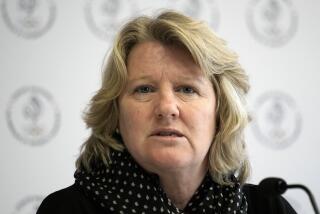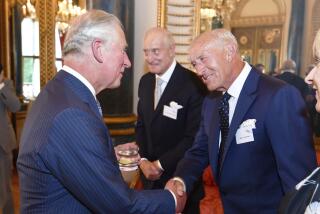Judgment Call
- Share via
SALT LAKE CITY — Reacting to the controversy over the ice dancing judging during the 1998 Winter Olympics in Nagano, Japan, one judge told L’Equipe, a French sports publication, “In the last 10 years, there has been an incredible evolution [in judging figure skating].
“Of course, there are still mistakes. But there is no flagrant injustice. Everyone on the [medals] podium deserves it.”
The judge was Marie Reine Le Gougne.
Four years later, she is at the center of a controversy because of her role in a decision during the Winter Olympic pairs competition that many consider a flagrant injustice. It also is leading to questions about whether judging has evolved enough. Or at all.
Le Gougne, a veteran judge who is president of the Strasbourg Sports Club in eastern France, allegedly told fellow judges immediately after the pairs freestyle program that she had been pressured by the French figure skating federation to side with Russians Elena Berezhnaya and Anton Sikharulidze. They won a controversial 5-4 decision over Canadians Jamie Sale and David Pelletier, creating a public furor.
Le Gougne’s alleged comments also prompted an investigation by the International Skating Union, which governs figure skating and speedskating. Although Le Gougne has been unavailable to the media, a source close to the investigation said she has denied making the comments. The source said she also denied receiving pressure from the French federation.
Le Gougne has been an outspoken defender of figure skating judging.
“I am fed up,” she told L’Equipe in 1998 after a French television network broadcast a documentary charging corruption by judges. “It’s easy to throw stones at us. Yes, I am very angry because some people [criticize] us despite not knowing a thing. They are concentrating on the bad apples when 99.9% of judges are trying to do their work honestly.”
Yet, she said she can often predict the outcome of a competition before it begins merely by looking at the composition of the judging panel.
She also has acknowledged favoring French skaters.
“The system being what it is, yes, I am trying to give the French skating a good image,” she said in the L’Equipe interview.
On the other hand, she said she would not give higher marks to a French skater if a competitor from another country clearly skated better. In 1998, she was on the judging panel for men’s singles and gave the highest marks to Russian Ilia Kulik, who won the gold medal. She gave second-place marks to Frenchman Philippe Candeloro, who finished third.
Another veteran figure skating judge, who did not want to be identified, said he has been on numerous panels with Le Gougne and considers her a better-than-average judge.
But he also said she is considered “high maintenance” because she is “extremely emotional.”
According to the Associated Press, Didier Gailhaguet, president of the French Ice Sports Federation, denied Wednesday that the federation pressured Le Gougne but said she had been “somewhat manipulated” by people close to her. He was quoted as calling her a “fragile person.”
Gailhaguet released a statement Thursday saying that his comments were “completely misinterpreted.”
Le Gougne, believed to be in her late 30s or early 40s, has complained in the past about sexism in the sport.
She wrote an article last year for a Web periodical, L’Humanite, describing her judging experience as “10 years of hell.”
“To succeed, you have to prove yourself 20 times more than a man. I know a lot of young girls who stopped because they didn’t have the strength to continue to fight.”
More to Read
Go beyond the scoreboard
Get the latest on L.A.'s teams in the daily Sports Report newsletter.
You may occasionally receive promotional content from the Los Angeles Times.






